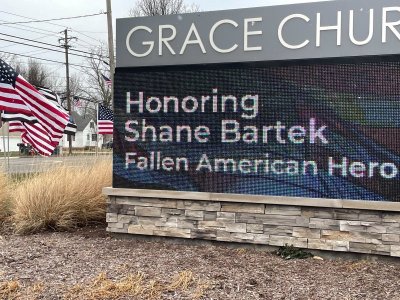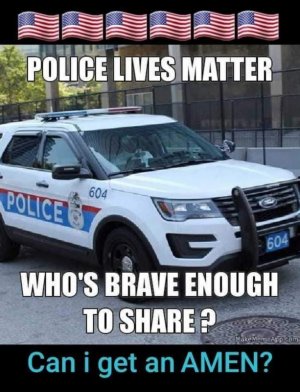You are using an out of date browser. It may not display this or other websites correctly.
You should upgrade or use an alternative browser.
You should upgrade or use an alternative browser.
Off Duty Police Officer Shot and Killed This Evening
- Thread starter Ruthanne
- Start date
FastTrax
Well-known Member
Oh boy do I know! There's no going back either
One way door......ENTER
There is a trial coming up and I will post a new thread once it begins. Thanks to those of you who have supported the case of Officer Bartek shot down at 25 yrs. old.
True why haven't the bad ones been pushed out?As an ex cop, you have to turn off that part of your brain to work effectively. Yes, there are bad apples but I still believe there are more good ones than bad and they just don't get enough credit nowadays.
Why do these things still happen
RFW
Certified Night Owl
- Location
- United States
Politics and bureaucracy. That's all I'm going to say.True why haven't the bad ones been pushed out?
Why do these things still happen
Knight
Well-known Member
The narrative could have beenThis is truly tragic, but I do have one question...
Since the officer was off duty, was he dressed in civilian clothes or was he dressed in his uniform? I'm sure he wasn't in his police cruiser or they would have never tried to carjack him.
This changes the narrative. Was he truly a police officer who was in harm's way because of his job or did these two thugs just want to carjack a civilian. In that case, it could have been anyone and really had nothing to do with his being a police officer.
Granted, this makes it no less tragic, and I feel for his family, but again it does change the narrative and the whole direction of this thread. I don't see any details in any of the posts. I may have missed them.
Black couple charged with the murder of an off duty police officer.
The headline is clear in that he was off duty. Since incidence of police being shot while sitting in their police car have happened. How can you be sure?
Quote
" I'm sure he wasn't in his police cruiser or they would have never tried to carjack him."
I wonder if identifying the couple as black would change the direction of this thread.
Last edited:
dseag2
Dallas, TX
- Location
- Dallas, TX
Not sure what kind of issue you have with me or with African Americans but if your animosity towards me makes you feel good, kudos to you!The narrative could have been
Black couple charged with the murder of an off duty police officer.
The headline is clear in that he was off duty. Since incidence of police being shot while sitting in their police car have happened. How can you be sure?
Quote
" I'm sure he wasn't in his police cruiser or they would have never tried to carjack him."
I wonder if identifying the couple as black would change the direction of this thread.
We all have different opinions on this forum, so you feel free to post yours and I assure you this will be my last interaction with you.
I'll leave you with this. Can't wait until you try to defend it.
Last edited:
Knight
Well-known Member
No issue with black American's. My wife has a permanent light tan color. She is native Puerto Rican. My one daughter in law is as black as the woman pictured. As for you. I questioned how you would know that they wouldn't have tried to hijack a police officer in a police car. That is IMO pure speculation & had nothing to do with what took place.
What I have a problem with is how often the media identifies whites murdering blacks as part of a headline but doesn't identify blacks murdering whites as part of a headline. My preference would be to not identify race in any part of an article.
What I have a problem with is how often the media identifies whites murdering blacks as part of a headline but doesn't identify blacks murdering whites as part of a headline. My preference would be to not identify race in any part of an article.
Knight
Well-known Member
@deasag2
No reason to explain a montage of videos showing police officers doing their job. How they were doing it is videoed so we have an insight & verbal explanation now as to how not doing it correctly happens.
Not as exciting & no videos this article makes sense to me.
https://psmag.com/social-justice/black-cops-are-just-as-likely-as-whites-to-kill-black-suspects
Not surprisingly, they found a huge racial disparity when it comes to who gets killed by officers. "While only about 13 percent of the American population is black," they write, "28 percent of people killed by police are black."
The victims were overwhelmingly male (95.5 percent), and less than 1 percent were unarmed at the time of the incident. "The gun could been in the car, or on them, but it was there at the time they were killed," Menifield noted.
The majority of officers in these situations were white. But this reflects the fact that America's police forces are disproportionately made up of whites, who account for approximately three-quarters of all officers.
***I think this part has some bearing on what the media doesn't focus on.***
Crunching the numbers, the researchers report "white police officers actually kill black and other minority suspects at lower rates than we would expect if killings were randomly distributed among officers of all races."
In contrast, "we find that nonwhite officers kill both black and Latino suspects at significantly higher rates than white officers," they write. "This is likely due to the fact that minority police officers tend to be assigned to minority neighborhoods, and therefore have more contact with minority suspects."
But if individual-level racism isn't the issue, what is? Menifield and his colleagues make a strong argument that the fundamental problem is one of institutional culture.
"We believe that the disproportionate killing of black suspects is a downstream effect of institutionalized racism ... within many police departments," they write. At least in part, "disproportionate killing is a function of disproportionate police contact among members of the African-American community."
In other words, if a certain percentage of such encounters between the police and public end in tragedy, and cops are more likely to come into contact with black citizens (for instance, ordering African-American drivers to pull over at higher rates than whites), it stands to reason that black civilians are at greater risk of ending up dead.
Blaming racist cops for this problem is emotionally satisfying (it presents a clear villain) and suggests an easy fix (weed them out). But this research suggests the real problem is the entrenched set of biases and assumptions that pervade police forces, influencing the attitudes and actions of cops of all colors.
POLICEBIASRACISMCOPSQUICK STUDIESAFRICAN AMERICANS
Tom Jacobs
BY TOM JACOBS
Tom Jacobs is a senior staff writer at Pacific Standard, where he specializes in social science, culture, and learning. He is a veteran journalist and former staff writer for the Los Angeles Daily News and the Santa Barbara News-Press.
No reason to explain a montage of videos showing police officers doing their job. How they were doing it is videoed so we have an insight & verbal explanation now as to how not doing it correctly happens.
Not as exciting & no videos this article makes sense to me.
https://psmag.com/social-justice/black-cops-are-just-as-likely-as-whites-to-kill-black-suspects
Not surprisingly, they found a huge racial disparity when it comes to who gets killed by officers. "While only about 13 percent of the American population is black," they write, "28 percent of people killed by police are black."
The victims were overwhelmingly male (95.5 percent), and less than 1 percent were unarmed at the time of the incident. "The gun could been in the car, or on them, but it was there at the time they were killed," Menifield noted.
The majority of officers in these situations were white. But this reflects the fact that America's police forces are disproportionately made up of whites, who account for approximately three-quarters of all officers.
***I think this part has some bearing on what the media doesn't focus on.***
Crunching the numbers, the researchers report "white police officers actually kill black and other minority suspects at lower rates than we would expect if killings were randomly distributed among officers of all races."
In contrast, "we find that nonwhite officers kill both black and Latino suspects at significantly higher rates than white officers," they write. "This is likely due to the fact that minority police officers tend to be assigned to minority neighborhoods, and therefore have more contact with minority suspects."
But if individual-level racism isn't the issue, what is? Menifield and his colleagues make a strong argument that the fundamental problem is one of institutional culture.
"We believe that the disproportionate killing of black suspects is a downstream effect of institutionalized racism ... within many police departments," they write. At least in part, "disproportionate killing is a function of disproportionate police contact among members of the African-American community."
In other words, if a certain percentage of such encounters between the police and public end in tragedy, and cops are more likely to come into contact with black citizens (for instance, ordering African-American drivers to pull over at higher rates than whites), it stands to reason that black civilians are at greater risk of ending up dead.
Blaming racist cops for this problem is emotionally satisfying (it presents a clear villain) and suggests an easy fix (weed them out). But this research suggests the real problem is the entrenched set of biases and assumptions that pervade police forces, influencing the attitudes and actions of cops of all colors.
POLICEBIASRACISMCOPSQUICK STUDIESAFRICAN AMERICANS
Tom Jacobs
BY TOM JACOBS
Tom Jacobs is a senior staff writer at Pacific Standard, where he specializes in social science, culture, and learning. He is a veteran journalist and former staff writer for the Los Angeles Daily News and the Santa Barbara News-Press.



